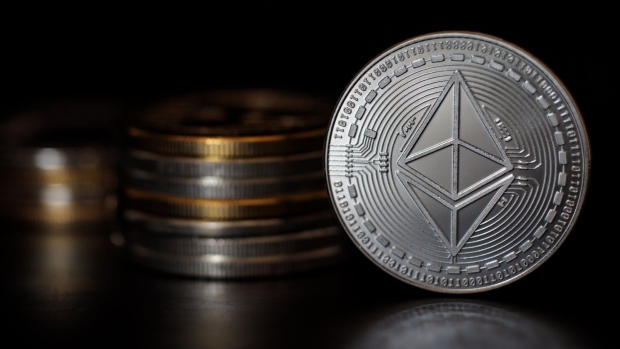Apr 5, 2023
Regulator Turf War Heats Up Ahead of Ethereum Shanghai Upgrade
, Bloomberg News

(Bloomberg) -- Ethereum, the world’s most used blockchain, is days away from a pivotal upgrade that could lure billions of dollars into its native token. But the software update is already generating scrutiny from Wall Street regulators.
Ether has attracted the attention of US Securities and Exchange Commission Chair Gary Gensler, who says that cryptocurrencies like it ought to be regulated as securities. That’s an opposing stance to Commodity Futures Trading Commission Interim Chair Rostin Behnam, who insists that Ether’s a commodity. Ethereum’s software upgrade next week has only raised the stakes in that debate.
That’s because the April 12 update, dubbed ‘Shanghai,’ will allow users to withdraw Ether that they “staked” or deposited on the blockchain. The move follows Ethereum’s long-awaited ‘Merge’ upgrade in September that initially allowed users to “stake” coins to earn passive income — much like fixed deposits at a bank. Now, Shanghai will allow them to take those coins out, plus any interest earned.
But unlocking the staked Ether and any associated rewards could result in regulatory backlash.
“The SEC will likely view the payment of rewards as yield, confirming the existence of investment contracts between the customers and the existing third-party staking services,” said Lara Gatz, a former federal prosecutor with the Department of Justice who recently joined Reed Smith LLP as a partner in its global regulatory enforcement practice. Once that happens, claims could arise that staking services engaged in unregulated and therefore illegal securities offerings, she said.
Meanwhile, Behnam reiterated just last week that Ether should be considered a commodity as its derivatives products are listed on CFTC exchanges — contradicting comments by Gensler who has insinuated that proof-of-stake tokens are securities, under the SEC’s purview.
The turf war between regulators and any pending litigation could prove costly for staking providers trying to diversify their revenue streams, and create uncertainty for stakers seeking double-digit returns without having to sell coins into a volatile market.
The total value of all staked assets stands at $67.8 billion as of March 31 with an average yield of 11.6%, while Ether’s yield was 5.8%, according to Staked, a unit of crypto exchange Kraken.
A representative for the SEC declined to comment on individual tokens or entities, while the CFTC and Ethereum Foundation didn’t reply to requests for comment.
War of Words
Regulatory momentum has been swelling since September, when Ethereum switched to its so-called proof-of-stake method of ordering transactions from proof-of-work — which Bitcoin still uses and employs power-hungry computers to help secure the network and verify transactions.
Ethereum’s new interest-earning feature and the fact that developers can change its mechanism prompted Gensler to suggest that proof-of-stake tokens could be regulated as securities. That’s a reversal of the commission’s stance from a few years ago, when its former director of corporate finance, William Hinman, declared that Ether wasn’t a security under the Howey Test — a four-pronged assessment the SEC uses to determine what qualifies as a security.
“The real question is, once Shanghai is live, and investors have access to their staking rewards, how long will it take for SEC Chair Gary Gensler and the SEC to argue that the Ethereum PoS blockchain itself is fulfilling investment contracts, and thus engaging in unregistered and therefore illegal securities offerings?” said Gatz.
In February, the SEC alleged that San Francisco-based Kraken’s staking service was an illegal sale of securities. As a result, the exchange will pay $30 million to settle and also shutter those services for US clients. In March, Coinbase Global Inc. — another popular exchange — received an SEC notice for potential securities law violations, including to do with its staking services. Coinbase is the second-largest depositor of staked Ether, data from Etherscan show.
“The SEC has sent a clear message that they do not approve of exchanges offering staking-based products and services,” said Gatz, commenting on the moves.
Meanwhile, New York Attorney General Letitia James explicitly called Ether a security in a lawsuit against Seychelles-based KuCoin, pointing to factors like investors’ expectation of returns, the organization of developers behind Ethereum and the initial coin offering.
“Today, it is going to be really hard to find any regulator that doesn’t believe tokens are securities,” said Yankun Guo, a partner at Chicago-based law firm Ice Miller. “A lot of companies will have additional barriers to become profitable or just to be able to operate and continue on.”
Some leading figures in crypto, including Kraken’s former CEO Jesse Powell, have criticized the lack of clear regulatory guidance.
“Regulators, retail investors that have lost money, they are all looking for someone to blame,” said Guo.
While some Ether holders may try to cash out soon after the upgrade, in the long run, the flexibility of withdrawing coins is expected to boost staking.
“Users who were hesitant about depositing, such as crypto exchanges, hedge funds who have a long-only strategy or execute more complex trades, as well as exchange-traded product providers, would be more comfortable with staking after withdrawal is enabled,” said Coinshares research associate Marc Arjoon. “ETP providers that offer staking yields through such vehicles will be able to redeem shares when their investors want to withdraw.”
By 2027, the amount of staked Ether tokens is expected to reach 50% of total Ether supply, according to Arjoon. That’s about $102 billion worth of coins, up from the $30 billion currently locked in, totaling 15% of supply, data from Dune Analytics show based on Ether’s price and staking ratio.
©2023 Bloomberg L.P.





